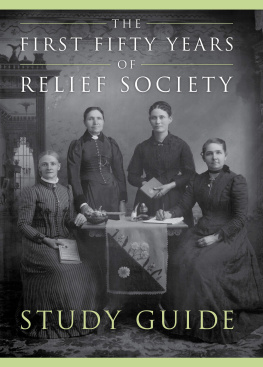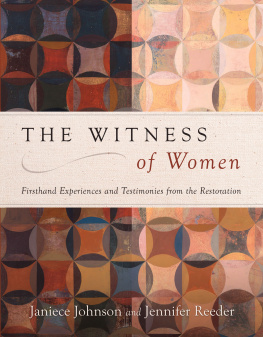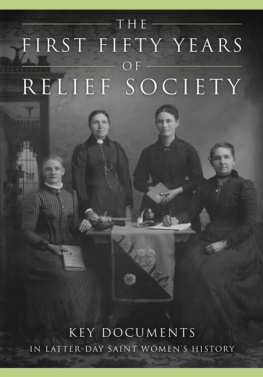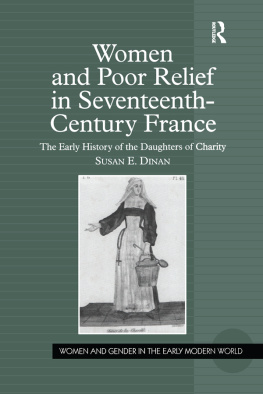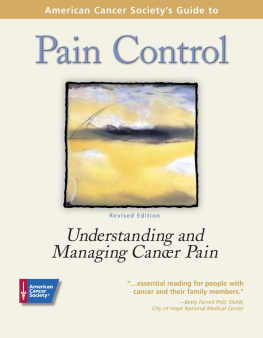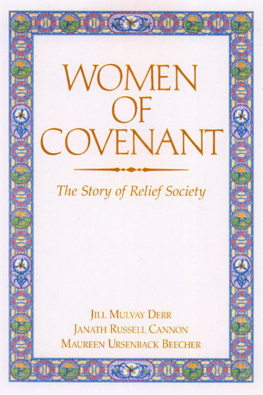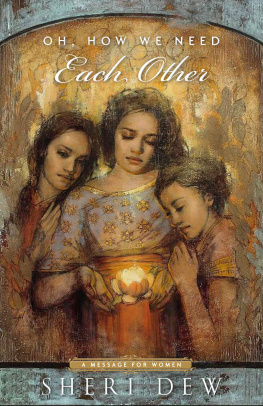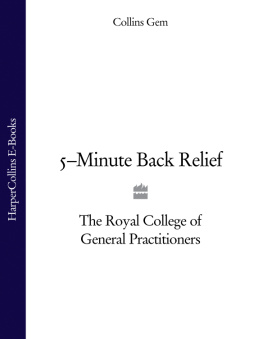11
Seeking Holiness
In blessing and setting apart certain duties in Zion,... [women] may be appointed... to instruct, to exhort, to strengthen, and to build up a holy people unto the Lord. In these important duties, God hath given them a power; and he will be with them, and greatly bless them, and give them an honorable name which shall not be blotted out, but shall remain for ever.
Quorum of the Twelve Apostles, 1880 (FFY 4.8, 488)
Paul called the Romans to be saints, or holy ones (Romans 1:7). He instructed the Corinthians that Saints are sanctified in Christ Jesus (1 Corinthians 1:2). Peter commanded, Be ye holy (1 Peter 1:16). In restoring the Church of Jesus Christ, Joseph Smith reviewed Paul and Peters counsel to join the fellowship of Christ. In particular, Joseph encouraged women to seek holiness, the distinguishing mark of a Latter-day Saint. The Greek definition of saint is holy, consecrated, or separated for a sacred purpose. So are the women of Relief Society.
Joseph Smith taught the Nauvoo women to be witnesses of Christ, to act honestly and uprightly in all their proceedings inasmuch as they would be calld to give an account to Jehovah (FFY 1.2.7, 53). Following Smiths counsel, at the 5 August 1843 meeting, Mrs. Chase exhorted the Sisters to faithfulness [and] to be much in prayer. She stood a living witness for Jesus of Nazareth [and] knew he had poured his Spirit upon her. Inasmuch as we visit the sick, we shall be blesst. I mean to do all that I can to releave their necessities. We must be humble and overcome the powers of darkness & live by faith (FFY 1.2.25, 113). The Relief Society became a location for women to seek holiness by providing relief, finding relief, and testifying of and partnering with Jesus Christ.
Both Joseph Smith and president Emma Smith charged the Nauvoo women to repent as part of their efforts to seek holiness. Emma encouraged the women to have the honor of commencing a good work and of carrying it out. [She] enforced the necessity of walking in a manner that would be approbated by God (FFY, 1.2.4, 47). Thus part of the charge of seeking holiness is the actual process of repentance, of utilizing the Atonement of Jesus Christ to turn to God the Father. Relief Society todayboth in our lessons and in our relationships and activitiesshould reflect this effort to repent. We must create a space for that to happen, to individually repent and to freely forgive our sisters and others, based on the grace of Christ.
In addition to repentance, seeking holiness involves active service. King Benjamin connected the two ideas: to retain a remission of sin, we must serve others (see Mosiah 4:26). Moroni taught that charity is the pure love of Christnot just acts of philanthropy (see Moroni 7:47). In the 9 June 1842 meeting of the Nauvoo Relief Society, Joseph taught, Nothing is so much calculated to lead people to forsake sin as to take them by the hand and watch over them with tenderness. When persons manifest the least kindness and love to me, O what powr it has over my mind, while the opposite course has a tendency to harrow up all the harsh feelings and depress the human mind. It is one evidence that men are unacquainted with the principle of godliness, to behold the contraction of feeling and lack of charity. The powr and glory of Godliness is spread out on a broad principle to throw out the mantle of charity (FFY 1.2.12, 78). In the last meeting of the Nauvoo Relief Society, Emma reinforced Josephs teaching, speaking of the importance of being united among ourselves and strengthening each others in hands in order that we may be able to do good. She concluded, encouraging women, as Joseph had done, to use the mantle of charity as a shield (FFY 1.2.34, 14). This is holiness. We, too, seek godliness.
How do you watch over others with tenderness? How have you been a stumbling block to someone else receiving the mantle of charity? How have you allowed someone to block your access to charity? In what ways do you access holiness and godliness? How do you know your walk is approved by God? In providing relief for another, how do you find relief for your soul?
2.23 Eliza R. Snow, Discourse, 14 August 1873, Ogden, Utah
When Eliza R. Snow visited the Ogden Relief Society, she cited Peters teachings to holy women (see 1 Peter 3:3-5) and encouraged Latter-day Saint women to elevate their ambitions and recognize the importance of their responsibilities. The act of seeking holiness is a constant process. It is not achieved in one experience or decision but is a daily effort. It is not expected of us as Latter-day Saint women to be perfectly holy, but to progress. As you read Elizas talk, think about your own personal pursuit of holiness. You may see that these teachings are not restricting; in fact, the quest expands and magnifies us, as Eliza teaches, because the works and duties for women in Zion are constantly increasing. No where on the earth has woman so broad a sphere of labor and duty, of responsibility and action. How have you been magnified by your spiritual efforts?
Snow reminded the women of Ogden the same thing we are promised today: the covenant of divine assistance through the Holy Ghost: For that satisfies and fills up every longing of the human heart, and fills up every vacuum. When I am filled with that spirit my soul is satisfied; and I can say in good earnest, that the trifling things of the day do not seem to stand in my way at all. When we rely on the Spirit, how does the Lord compensate for our mortal weakness? How has the Holy Ghost filled you? What does this teach us about grace and how the Atonement of Jesus Christ works? The Lord has promised us that His grace is sufficient for all of us.
Eliza concluded her talk with the promise of divine assistance: By seeking to perform every duty you will find that your capacity will increase, and you will be astonished at what you can accomplish. You have been astonished at what duties you have done. The Lord will help us. The Lord is with His Saints and helps them to do His will and He watches over them by night and by day. Inasmuch as we continue faithful, we shall be those that will be crowned in the presence of God and the lamb. You, my sisters, if you are faithful, will become Queens of Queens, and Priestesses unto the Most High God. These are your callings. Our Heavenly Father yearns to bless us with His holiness. The Lord will expand us as we take the steps to move in His direction.
4.11 Report of Deseret Hospital Dedication, 17 July 1882
As the Lord revealed the law of consecration He consistently reminded us that we must remember in all things the poor and the needy, the sick and the afflicted, for he that doeth not these things, the same is not my disciple (D&C 52:40). We are all poor or afflicted in some degree, and we all need the help of others, whether it be spiritual or temporal. The concept, planning, and execution of the Deseret Hospital by Relief Society women in Salt Lake City in the early 1880s demonstrates a way to seek holiness through serving the sick. Women were set apart as physicians, clerks, and matrons. Trained female doctors provided medical services alongside the administration of sacred ordinances, also by women. This work enabled both patients and women who ministered to them access to holiness. As you read the dedication, pay attention to how priesthood leaders supported the womens efforts. Notice their instructions for seeking holiness. Joseph F. Smith focused on the great potential of unity and being sensitive to the whisperings of the Spirit that they would be able to obtain the power of God. In an appeal to priesthood and auxiliary leaders, Eliza R. Snow affirmed, May the Spirit of Him, to whom the sick and afflicted never appealed for help in vain, influence the hearts of those were are favored with an abundance... to a generous response to this appeal, knowing that such gifts are doubly blessed, blessing both the giver and the receiver. How do their efforts apply to us today as we seek out the burdened and afflicted, as Christ would have us do? What prevents us from offering relief to others? How can we be more generous in offering relief? How do we receive relief? How might our afflictions be healed through service to others? How does turning outward and acting on behalf of others make us holy?

